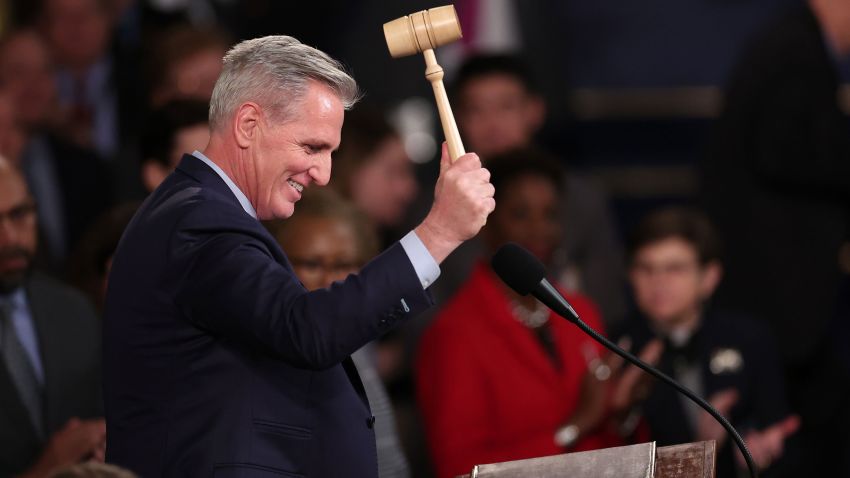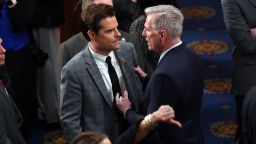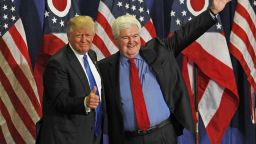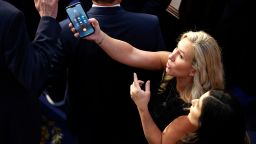Editor’s Note: Nicole Hemmer is an associate professor of history and director of the Carolyn T. and Robert M. Rogers Center for the Study of the Presidency at Vanderbilt University. She is the author “Partisans: The Conservative Revolutionaries Who Remade American Politics in the 1990s.” She cohosts the history podcasts “Past Present” and “This Day in Esoteric Political History.” The views expressed in this commentary are her own. View more opinion on CNN.
The chaotic start to the 118th Congress resurrected some nearly-forgotten parts of long-ago history, from endless balloting over electing the Speaker of the House to a near-brawl on the House floor. But it also revived a more recent debate about the Republican Party: the role of former President Donald Trump in the party’s turbulent, rebellious turn.

Following the fourth failed vote for Speaker, New York Times journalist Peter Baker noted on MSNBC that the Republicans voting against nominee Kevin McCarthy, all fervent Trump supporters, were “following his playbook,” drawing inspiration from the man he called “the chief disrupter.”
Baker’s comments reflect a common narrative of Trump-exceptionalism: the idea that Trump represents a uniquely disruptive force that veered the Republican Party off its pre-2016 path. But Trump exceptionalism gives too little credit to the right’s long history of destructive politics, and too much credit to Trump for shaking up commitments within the GOP to obstruction and fiscal radicalism.
With the House under Republican control and Trump’s 2024 presidential campaign now underway, making sense of right-wing politics requires a more nuanced understanding of the relationship between Trump and the Republican Party.
It’s easy to see why the Trump-exceptionalism narrative persists. Polls that accompanied Trump’s rise showed Republicans were more than willing to change their minds on certain issues to signal support for Trump, whether it was a new skepticism about free trade and international alliances or new support for Russia. The 2020 Republican platform listed no policies, just support for Trump. And the party largely rallied to Trump’s positions on election denialism and the insurrection.
There’s no denying Trump had an unusually potent impact on the party. But he largely fell in line on Republican standards like fiscal policy and Supreme Court nominations. And when he did deviate from conventional GOP priorities — as he did with his support of $2000 stimulus checks after the 2020 election — many Republicans, including Senate Majority Leader Mitch McConnell, did not follow his lead. When it came to the policies that have long been most central to the party’s right-wing base, there was no collective about-face to be found.
All of this suggests Trump’s presidency was, in important ways, the continuation of critical dynamics within the Republican Party and the conservative movement, not a disruption of them. When it comes to the current chaos in Congress, this is especially true, because the forces that have led factions of the party to revolt against Republican leadership are the same forces that led to Trump’s election.
The populist-conservative tendency toward anti-establishment politics emerged in the Cold War, when the target was the liberal establishment. But the successes of Presidents Richard Nixon and Ronald Reagan meant that, by the 1990s, there was a significant conservative establishment ripe for rebellion.
That rebellion began almost immediately after Reagan’s departure from office. Newt Gingrich, while part of the Republican leadership in the House, helped Republican President George H.W. Bush hammer out a budget deal in 1990 — then immediately ran to the press to denounce it. When Gingrich became Speaker in 1995, he joined the Republican establishment and immediately became a target. A group calling themselves the True Believers, the most conservative slice of a radically conservative Congress, regularly attempted to obstruct and oust Gingrich. When the Tea Party caucus emerged in the 2010s, they did the same to Speaker John Boehner.
Republican rebels turned against their leaders in part because of changes in the makeup of the party, and in part because of changes in the media landscape. The Republican Party grew sharply more conservative in the 1990s. Infuriated with the compromise politics of the George H.W. Bush years, conservative Republicans began to insist on more hardline positions — and demonize moderate members of the party as “Republicans in Name Only.”
Throughout the decade, many of the remaining moderate Republicans retired, switched parties or shifted their politics rightward. As the party grew more uniformly conservative, intraparty differences became more about tactics than ideology. Compromise became verboten; novel means of obstruction became popular.
That hard-right shift accelerated thanks to the rising power of conservative media. Many on the right followed this trend in part as a consequence of a newly conservative Republican Party and in part as a consequence of a strengthening conservative media system.
Right-wing media, less invested in governing than ratings, advanced maximalist positions. On radio talk shows like Rush Limbaugh, any attempts to work with Democrats earned a Republican an on-air lashing. Members of Congress looking to make a national name for themselves, or stave off a primary challenge, saw a lot of upsides in becoming hardliners and disrupters.
By the time Trump came along, he was following a trend, not starting a movement. Attacking the Republican establishment? The right had been doing that for decades. Flaying Fox News for being too liberal? Newt Gingrich and Rick Santorum had pulled that trick in the 2012 primaries.
Still, Trump had a notable impact on the right. His candidacy electrified, and metastasized, the anti-establishment faction in the party that had been festering and bubbling up for decades. But rather than overthrowing the Republican establishment, he grafted the two parts of the movement together. (Which is why it was so odd to hear pundits describe the anti-McCarthy bloc as extremists; by 2023, a sizeable majority of Republicans in the House have embraced extremism.)
At the same time, Trump reinforced the incentives of disruption, performative anti-establishmentarianism and self-above-party politics – a legacy clear in the anti-McCarthy faction’s actions.
The fight among House Republicans last week had little to do with Trump. What it did was shine light on the factors contributing to the party’s continued decline: the weakness of the party establishment, the opportunities for self-interested actors, and the very high odds that, as the new Congress gets underway, the chaos will continue. And that means, regardless of Trump’s own political fortunes, the future of Republican governance will almost certainly feature more government dysfunction and more damage to the nation’s economic and political health.







